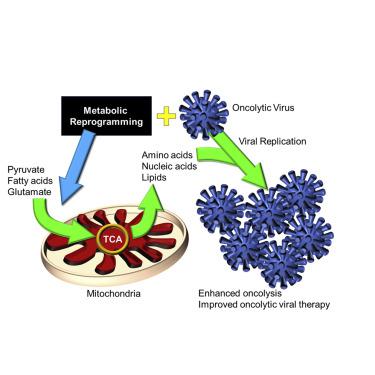Molecular Therapy ( IF 12.1 ) Pub Date : 2020-03-20 , DOI: 10.1016/j.ymthe.2020.03.014 Barry E Kennedy 1 , Maryanne Sadek 1 , Shashi A Gujar 2

|
Oncolytic viruses (OVs) represent a promising new class of cancer therapeutics and cause antitumor effects by two major mechanisms: (1) directly killing cancer cells in a process known as oncolysis, or (2) initiating a powerful antitumor immune response. Interestingly, energy metabolism, within either cancer cells or immune cells, plays a pivotal role in defining the outcome of OV-mediated antitumor effects. Following therapeutic administration, OVs must hijack host cell metabolic pathways to acquire building blocks such as nucleotides, lipids, and amino acids for the process of replication that is necessary for oncolysis. Additionally, OV-stimulated antitumor immune responses are highly dependent on the metabolic state within the tumor microenvironment. Thus, metabolic reprogramming strategies bear the potential to enhance the efficacy of both OV-mediated oncolysis and antitumor immune responses.
中文翻译:

有针对性的代谢重编程,以提高溶瘤病毒治疗的功效。
溶瘤病毒(OVs)代表着一种有前途的新型癌症治疗方法,并通过两种主要机制引起抗肿瘤作用:(1)在称为溶瘤的过程中直接杀死癌细胞,或(2)启动强大的抗肿瘤免疫应答。有趣的是,癌细胞或免疫细胞内的能量代谢在确定OV介导的抗肿瘤作用的结果中起着关键作用。治疗性给药后,OV必须劫持宿主细胞的代谢途径,以获取构建蛋白(如核苷酸,脂质和氨基酸)以进行溶瘤所必需的复制过程。另外,OV刺激的抗肿瘤免疫应答高度依赖于肿瘤微环境内的代谢状态。从而,









































 京公网安备 11010802027423号
京公网安备 11010802027423号